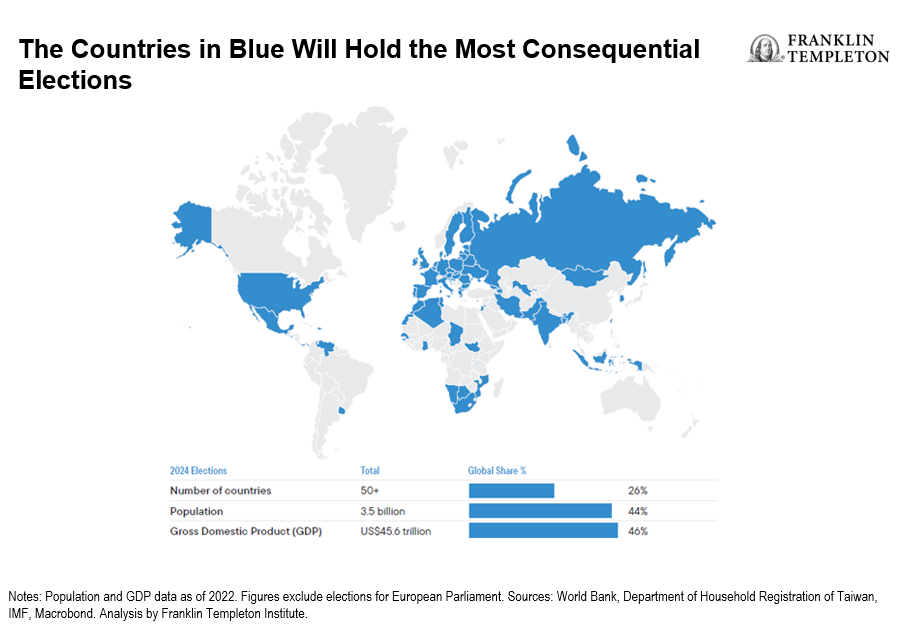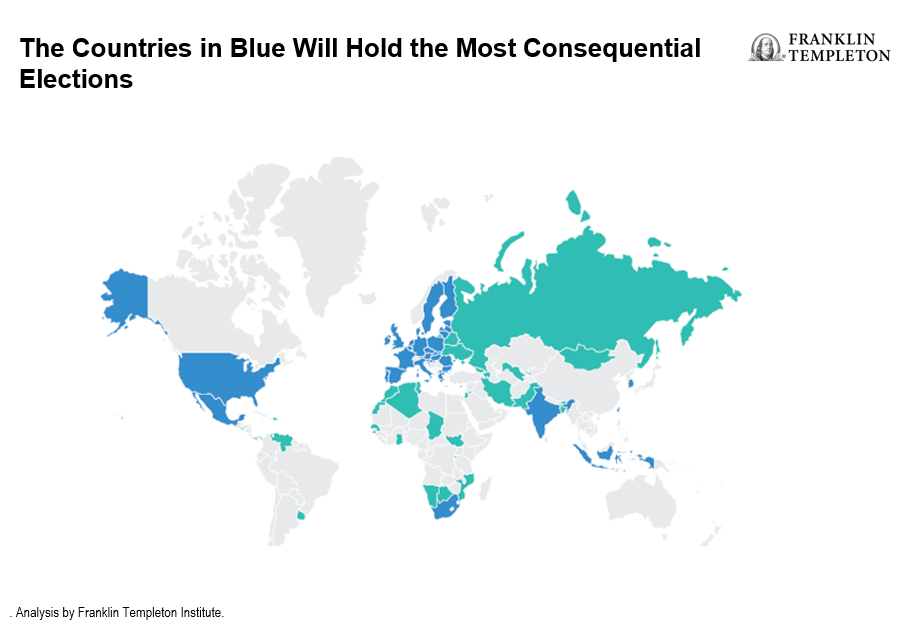What do this year’s global elections mean for investors?
International investors understand that domestic politics drive policy direction in any country. Elections are viewed as sometimes-risky periods, as we wait to see which political leader voters chose and assess the implications of their stated policy objectives. In any case, even narrow elections have consequences, although the impact on investors is sometimes not immediately obvious.
More than 50 countries are expected to hold national elections in 2024. That number includes presidential and legislative elections, but also local government elections that are national in nature and will impact domestic politics, potentially facilitating or obstructing the government in the pursuit of their objectives.
Exhibit 1: Political Risk Is Global in 2024
Some of these elections can be categorized as “free and fair,” meaning that citizens can stand for election and campaign fairly, allowing the voters to choose their preferred candidate on an even playing field. In authoritarian countries, like Russia and Venezuela, citizens can vote, but the contest is neither free nor fair, with opposition leaders in jail and campaigning, freedom of speech and association all severely restricted. Finally, we have a third classification, hybrid democracies, which are functioning democracies with weaknesses in their electoral systems and their governance.
The predictability of election outcomes
Some election outcomes are predictable because they are held in authoritarian countries, while others are predictable because one of the contenders has an exceptionally big lead over a weak, fragmented opposition.
However, investors will be focused on the elections held in the countries that are most relevant to their investment portfolios, and those countries where a binary election outcome has the potential to generate investment profits or losses, depending on the capital markets’ assessment of a country’s future economic prospects.
Exhibit 2: Which Are the Most Relevant Elections for International Investors?
In Exhibit 2, we have highlighted in blue the territories where our clients have the most interest in for investment reasons. India will hold the biggest election in terms of number of voters and it will be the longest-lasting, over months, while Indonesia will hold the largest election held on a single day. As the world’s largest economy, the US presidential election in November is clearly very important because of the impact the next president could have globally.
In Taiwan, the recent elections resulted in a Democratic Progressive Party (DPP) president, but a legislature dominated by the opposition Kuomintang (KMT) and Taiwan People’s Party (TPP) parties. With no party gaining a majority, President William Lai will have to negotiate with the opposition parties to execute on policy. The two high-profile policies he campaigned on are the phasing out of nuclear power (with a determined drive to boost solar and wind power) and the lengthening of military service from four months to a full year for young Taiwanese. Investors have already driven up the valuations of wind-power-related companies on the Taiwan Stock Exchange and will anticipate a continued campaign for Taiwan to open access to more export markets around the world.
Investment implications from other elections
Indonesia: On February 14, approximately 205 million voters1 will select the next president and the representatives in the legislature (in Indonesia, serving members of the armed forces and police are not allowed to vote). The polls indicate ex-General Prabowo Subianto is in the lead with a 20-point gap, but may not reach the 50% threshold, triggering a second round against either Anies Baswedan (ex-governor of Jakarta) or Ganjar Pranowo (ex-governor of Central Java). It is difficult to predict the winner, as over 60%2 of eligible voters are under 40 years of age, meaning that climate change, education, corruption and jobs are key issues. For investors, it seems likely that Indonesia will be able to continue to balance relationships with China and the United States, while being well placed to build a key position in the new architecture of global supply chains, based around its critical mineral resources. The key variation looks to be the degree of protectionism around the natural resources sector, depending on the winning candidate.
India: Around 945 million3 registered voters in India will have the opportunity to elect their representatives in the Lok Sabah. The latest polls suggest that Prime Minister Narendra Modi’s personal popularity will sweep him back into power at the next elections, although his party may have a diminished majority in parliament. The opposition has formed a 26-party coalition under the acronym INDIA, but it lacks a unifying leader to rival Modi. This third term of a Bharatiya Janata Party (BJP)-led government is expected to continue pushing the “Make in India” agenda, while investment in infrastructure is a necessity. India will likely continue to block Chinese investment in electric vehicles, preferring to subsidize domestic production. The 2024 budget will show increasing tax revenues, and investors anticipate a reduction in interest rates post elections. There may be some progress with the implementation of new labor laws, which could attract foreign direct investment. International investors have high expectations; post-election policy execution is key.
European Union (EU): In June, around 450 million citizens4 of the 27 member states of the EU will hold elections for the European Parliament. Historically it has been dominated by center parties—the European Peoples’ Party (EPP) and the Socialists and Democrats (S&D). This time, the polls suggest a more “right-wing” looking EU. Some might think that this is a problem, but the reality is that it depends very much on the composition of the “right wing.” The moderate European Conservatives and Reformists (ECR) are very anti-Russia and immigration and reject a federal EU, but do work with center parties. The newer and rising Identity and Democracy (I&D) grouping (including Italy’s Lega, France’s National Rally and Germany’s AfD) is more sympathetic to Russia and skeptical on Brussels and is less likely to be constructive in policymaking. In any case, investors should expect a closer alignment with the United States on China, with potentially more restrictions to inward investment, continued momentum for the “Green Transition” and a greater focus on border control and defense, leading to closer alignment with NATO.
United Kingdom: Although the government has until January 2025 to call elections, most observers expect elections in November or December 2024. The polls suggest that after 13 years, the Conservative Party is trailing by around 20 points, suggesting that a change is coming. A Labour government would probably lead to more productive relations with the EU, although there is no suggestion of a move to reverse Brexit. For investors, the conundrum remains to gauge the United Kingdom’s undoubted attractions, including low market valuations, with a productivity challenge at a time of stretched government finances and a tough economic outlook.
United States: It is hard to overstate the global importance of the presidential elections. The two-party system produces binary outcomes, but experience demonstrates that majorities in Congress and the Senate are key to any president’s ability to execute on their agenda. From available information, investors can expect policies to boost American manufacturing and reshoring to the (United States-Mexico-Canada Agreement (USMCA), continued obstacles to trade with China and a reluctance to commit to direct intervention in foreign wars. It seems that a Republican president may force closer cooperation between the United Kingdom and the EU and a move by Asian countries to hedge their position with regard to China.
The risks include AI and election disinformation
Perhaps ominously, this record year of elections around the world is also the first time that generative artificial intelligence (AI) tools such as Chat GPT and Midjourney became widely available—as well as the technology for “deepfakes,” where high-profile people can be digitally cloned for use in realistic videos. The implications for election campaigns are extremely concerning, as these new technologies could multiply and intensify attempts at spreading misinformation to influence electoral outcomes.
The threat of weaponized misinformation and already-prevalent geopolitical tensions suggests that it might be prudent to stay informed and knowledgeable on the issues, the dynamics of each election and the potential implications for policy direction. We at Franklin Templeton Institute can help.
WHAT ARE THE RISKS?
All investments involve risks, including possible loss of principal.
International investments are subject to special risks, including currency fluctuations and social, economic and political uncertainties, which could increase volatility. These risks are magnified in emerging markets. Investments in companies in a specific country or region may experience greater volatility than those that are more broadly diversified geographically.
The government’s participation in the economy is still high and, therefore, investments in China will be subject to larger regulatory risk levels compared to many other countries.
There are special risks associated with investments in China, Hong Kong and Taiwan, including less liquidity, expropriation, confiscatory taxation, international trade tensions, nationalization, and exchange control regulations and rapid inflation, all of which can negatively impact the fund. Investments in Taiwan could be adversely affected by its political and economic relationship with China.
Any companies and/or case studies referenced herein are used solely for illustrative purposes; any investment may or may not be currently held by any portfolio advised by Franklin Templeton. The information provided is not a recommendation or individual investment advice for any particular security, strategy, or investment product and is not an indication of the trading intent of any Franklin Templeton managed portfolio.
IMPORTANT LEGAL INFORMATION
This material is intended to be of general interest only and should not be construed as individual investment advice or a recommendation or solicitation to buy, sell or hold any security or to adopt any investment strategy. It does not constitute legal or tax advice. This material may not be reproduced, distributed or published without prior written permission from Franklin Templeton.
The views expressed are those of the investment manager and the comments, opinions and analyses are rendered as at publication date and may change without notice. The underlying assumptions and these views are subject to change based on market and other conditions and may differ from other portfolio managers or of the firm as a whole. The information provided in this material is not intended as a complete analysis of every material fact regarding any country, region or market. There is no assurance that any prediction, projection or forecast on the economy, stock market, bond market or the economic trends of the markets will be realized. The value of investments and the income from them can go down as well as up and you may not get back the full amount that you invested. Past performance is not necessarily indicative nor a guarantee of future performance. All investments involve risks, including possible loss of principal.
Any research and analysis contained in this material has been procured by Franklin Templeton for its own purposes and may be acted upon in that connection and, as such, is provided to you incidentally. Data from third party sources may have been used in the preparation of this material and Franklin Templeton (“FT”) has not independently verified, validated or audited such data. Although information has been obtained from sources that Franklin Templeton believes to be reliable, no guarantee can be given as to its accuracy and such information may be incomplete or condensed and may be subject to change at any time without notice. The mention of any individual securities should neither constitute nor be construed as a recommendation to purchase, hold or sell any securities, and the information provided regarding such individual securities (if any) is not a sufficient basis upon which to make an investment decision. FT accepts no liability whatsoever for any loss arising from use of this information and reliance upon the comments, opinions and analyses in the material is at the sole discretion of the user.
Products, services and information may not be available in all jurisdictions and are offered outside the U.S. by other FT affiliates and/or their distributors as local laws and regulation permits. Please consult your own financial professional or Franklin Templeton institutional contact for further information on availability of products and services in your jurisdiction.
_______________
1. Source: The Lowy Institute. March 1, 2023.
2. Source: Carnegie Endowment for International Peace, Comment. October 5, 2023.
3. Source: Economic Times. February 2, 2023.
4. Source: European Union – Key Facts and Figures.



